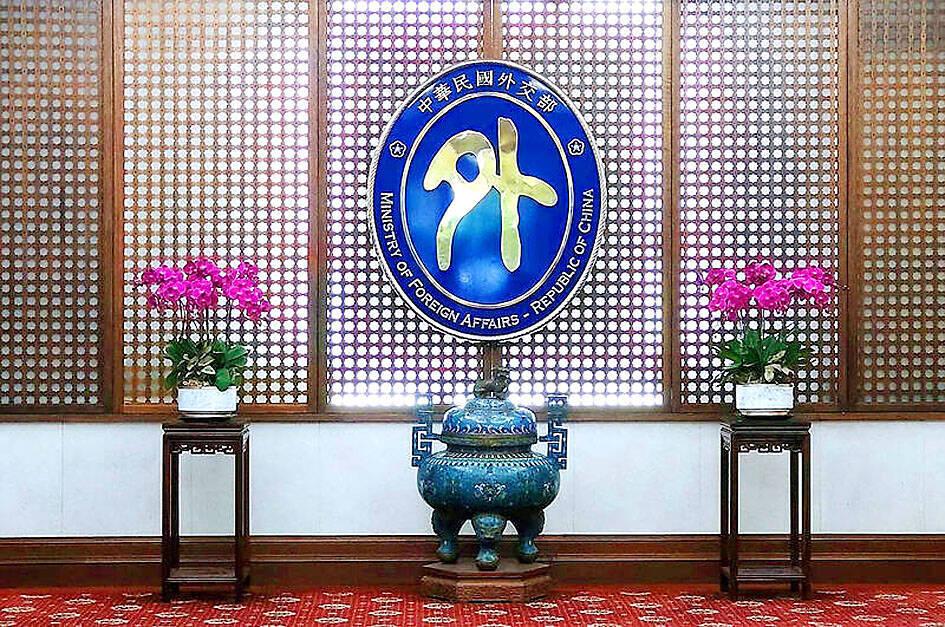The government is closely monitoring a new round of high-level talks in Washington aimed at ending the Russia-Ukraine war, the Ministry of Foreign Affairs (MOFA) said today, while stressing that humanitarian assistance to Ukraine would continue.
"The ministry has also been keeping abreast of the latest developments in the Russia-Ukraine war and the views of the US, Ukraine, European countries and Russia" regarding peace talks to potentially end the conflict, ministry spokesperson Hsiao Kuang-wei (蕭光偉) said.

Photo: Taipei Times
Taiwan would continue to closely monitor the situation in Ukraine and collaborate with the international community in areas such as humanitarian assistance, Hsiao told a weekly news briefing in Taipei.
Hsiao made the comments when asked about the stance of the government on the Russia-Ukraine war after Ukrainian President Volodymyr Zelenskyy visited the White House yesterday to meet US President Donald Trump for fresh talks aimed at ending the war in Ukraine.
There were no concrete commitments from the US side on Ukraine's security, nor any development toward a peace deal following the meeting.
However, Trump expressed optimism about the prospect of Zelenskyy and Russian President Vladimir Putin meeting at a later date.
Several European leaders also joined the Ukrainian leader in the White House meeting, which was held days after Trump met Putin in Alaska for a summit that failed to result in a ceasefire.
Since Russia's full-scale invasion began on Feb. 24, 2022, Taiwan's government has, together with like-minded countries, sought to help Ukraine, particularly in the area of humanitarian needs.
As of February, Taiwan had allocated more than US$130 million for Ukraine infrastructure projects such as bridges, hospitals, churches and schools, while private donations for the war-torn country have exceeded US$32 million, the ministry said.
Meanwhile, asked about Taiwan's view of a recent Trump TV interview in which he said that Chinese President Xi Jinping (習近平) told him that he would not invade Taiwan while Trump is in office, Hsiao said that Taiwan's security relies for the most part on its own efforts.
"That is why Taiwan has continued to enhance its self-defense capabilities and resilience, and we will keep doing so," Hsiao added.

US climber Alex Honnold is to attempt to scale Taipei 101 without a rope and harness in a live Netflix special on Jan. 24, the streaming platform announced on Wednesday. Accounting for the time difference, the two-hour broadcast of Honnold’s climb, called Skyscraper Live, is to air on Jan. 23 in the US, Netflix said in a statement. Honnold, 40, was the first person ever to free solo climb the 900m El Capitan rock formation in Yosemite National Park — a feat that was recorded and later made into the 2018 documentary film Free Solo. Netflix previewed Skyscraper Live in October, after videos

Starting on Jan. 1, YouBike riders must have insurance to use the service, and a six-month trial of NT$5 coupons under certain conditions would be implemented to balance bike shortages, a joint statement from transportation departments across Taipei, New Taipei City and Taoyuan announced yesterday. The rental bike system operator said that coupons would be offered to riders to rent bikes from full stations, for riders who take out an electric-assisted bike from a full station, and for riders who return a bike to an empty station. All riders with YouBike accounts are automatically eligible for the program, and each membership account

A classified Pentagon-produced, multiyear assessment — the Overmatch brief — highlighted unreported Chinese capabilities to destroy US military assets and identified US supply chain choke points, painting a disturbing picture of waning US military might, a New York Times editorial published on Monday said. US Secretary of Defense Pete Hegseth’s comments in November last year that “we lose every time” in Pentagon-conducted war games pitting the US against China further highlighted the uncertainty about the US’ capability to intervene in the event of a Chinese invasion of Taiwan. “It shows the Pentagon’s overreliance on expensive, vulnerable weapons as adversaries field cheap, technologically

NUMBERs IMBALANCE: More than 4 million Taiwanese have visited China this year, while only about half a million Chinese have visited here Beijing has yet to respond to Taiwan’s requests for negotiation over matters related to the recovery of cross-strait tourism, the Tourism Administration said yesterday. Taiwan’s tourism authority issued the statement after Chinese-language daily the China Times reported yesterday that the government’s policy of banning group tours to China does not stop Taiwanese from visiting the country. As of October, more than 4.2 million had traveled to China this year, exceeding last year. Beijing estimated the number of Taiwanese tourists in China could reach 4.5 million this year. By contrast, only 500,000 Chinese tourists are expected in Taiwan, the report said. The report